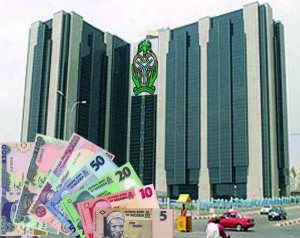
The Central Bank of Nigeria (CBN), Friday, disclosed insisted it will not devalue the naira in order to safeguard the Nigerian economy from the shocks and negative impact the depreciation will have.
In a statement signed by Director, Corporate Communications, Mr. Ibrahim Mu’azu, in reaction to an article in the Economist Magazine, the CBN said it does not panic and will not take desperate measures to satisfy few misguided interests in the market.
Mu’azu noted that the article seems to ignore the fact that the exchange rate is simply a price that is essentially determined by the forces of supply and demand, adding that the CBN believes that the 48 per cent decline in oil prices may not be transitory and made bold policy changes including closure of the subsidized Official Foreign Exchange (Forex) Window, which resulted in a 22 per cent depreciation in the currency, the Naira.
“Because the Nigerian economy is heavily dependent on imports and the exchange rate pass-through to inflation is high, we believe that this adjustment is optimal at this time.
“Contrary to the article’s argument, adjustments to a sharp decline in supply of US Dollars cannot all be borne by an indeterminate depreciation, without considering the full impact on the Nigerian economy.
“The demand side also has to be considered, not just in response to the pressure on the Naira but as an opportunity to change the economy’s structure, resuscitate local manufacturing, and expand job creation for our citizens.
“Take rice imports, for example: why should we keep allocating scarce forex to rice importers when vast amounts of paddy rice of comparable quality produced by poor hardworking local farmers across the rice belts of Nigeria are wasted, and farmers are falling deeper into poverty while we export their jobs and income to rice producing countries?
“Few decades ago, Nigeria was one of the world’s largest producers of palm oil but today we import nearly 600,000 Metric Tonnes while Indonesia and Malaysia combine to export over 90 percent of global demand.”
Muazu, however, noted that under the present circumstances, the CBN will do the little it can, through the introduction of huge subsidies, to protect the jobs and incomes of local farmers, using some of the same principles western economies used to justify the protection of their farmers.
He maintained that Nigeria cannot attain its full potentials by importing anything and everything, adding that for a long while now, the quest for importation has significantly weakened the operating capacities of industries in the country.
According to him, inflation is still within the CBN’s single-digit band, the exchange rate has stabilized around N197 per US Dollar for the last five months, GDP expanded by four per cent in the first quarter of 2015, and 469,070 new jobs were created in the same quarter.
“But now is a good opportunity to begin a reversal. Although the article hastily derides this idea as lacking in economic foundations, it is the same principles upon which many other countries do not allow importation of certain products.
“More also, if the article believes the CBN should adjust to reflect the current parallel market rate, why was this suggestion not made in the week following the inauguration of President Buhari when the same rate fell sharply to under N190 per Dollar?
“Furthermore, it appears condescending to suggest that the list of items seemed ‘to have been drawn up by someone wandering around a house and a building site’. On the contrary, items were only included after thorough and exhaustive discussions at the highest policymaking body of the Bank, with the strategic national interest of Nigeria.
“With ingenuity and productiveness, we believe that Nigerians will seize this opportunity and use it for the greater good of the country. As we transition into a new administration in Nigeria, we must continue to ensure policy stability at all times.”
The post Why CBN Won’t Devalue The Naira appeared first on INFORMATION NIGERIA.
Support InfoStride News' Credible Journalism: Only credible journalism can guarantee a fair, accountable and transparent society, including democracy and government. It involves a lot of efforts and money. We need your support. Click here to Donate
